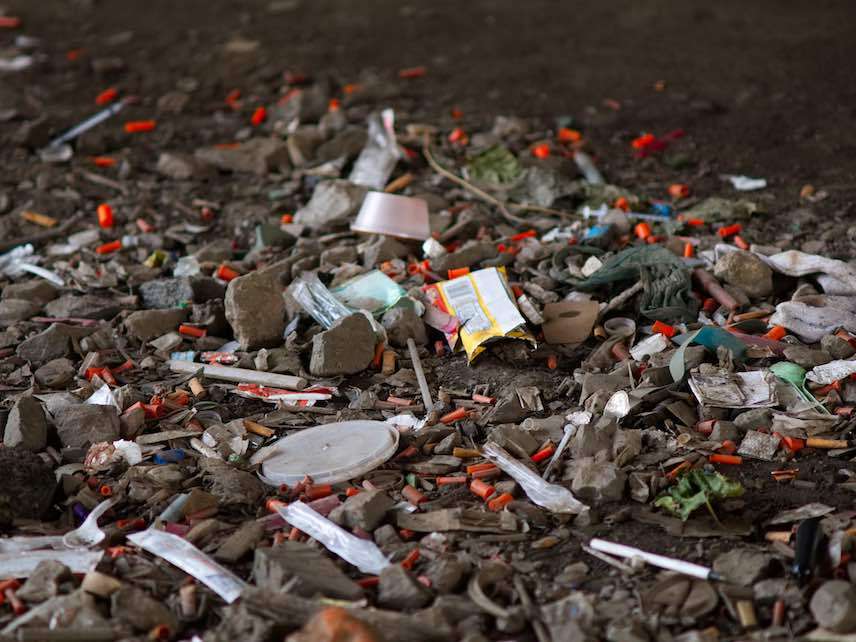How Many More People Have to Die From Heroin and Fentanyl Before We Try Something Different?
U.S. policymakers continue to pursue programs that punish at the expense of ones that save lives.

A panel of experts recently projected that 500,000 Americans could die of opioid-related overdoses between now and 2027, surpassing the annual death toll from AIDS during the worst years of that epidemic. Some of the experts polled put the potential opioid-related death toll at 650,000 over the next 10 years.
We can reach that grizzly milestone with our eyes closed if we just keeping doing what we've done for the last decade. But a future in which opioid and opiate-related overdoses claim more lives than a deadly communicable disease is no more inevitable than our present moment was a decade ago.
We got here by reacting poorly to the increase in prescription opioid abuse and associated deaths. There may be no point in asking how many more people would be alive today if we had made different choices when we first recognized this problem, but it's instructive to revisit the early days of this crisis anyway.
According to data from the Centers for Disease Control, just over 2,000 people died from heroin-related overdoses in 2005. In 2015, heroin killed 12,989 people. The total number of drug overdose deaths in 2005 was 29,813. In 2015, 52,404.
We have a pretty good idea of what happened between 2005 and 2015. Law enforcement cracked down on pill mills, the Food and Drug Administration admonished pharmaceutical companies to make their drugs harder to snort and inject, and the CDC and Health and Human Services discouraged doctors from prescribing pain medication.
In addition to being public health policies, these were also price signals. The black market responded accordingly with cheap heroin and then cheap illicit fentanyl. As Vox recently reported, there are many places throughout the U.S. where black market heroin and fentanyl now kill far more people than prescription pills.
With each new death record—and we are setting them every year now—the overdose problem moves further out of a realm regulators can control into one they can't and never will. Oddly enough, they don't seem to realize it.
Earlier this summer, Kentucky's legislature passed a law creating a three-day limit on opioid prescriptions for acute pain, meaning that no prescription can be for more than three days worth of pain relievers. In Massachusetts, Gov. Charlie Baker wants a five-year mandatory minimum for any person who provided the illicit drugs that led to an overdose death.
The Justice Department recently asked the U.S. Sentencing Commission to require every person convicted of distributing fentanyl to serve prison time, regardless of how little fentanyl is involved, whether they knew they were distributing fentanyl at all, and whether anyone died as a result. As Dr. Jeffrey A. Singer writes at Townhall, there's also a push to conduct more surveillance of doctors and their patients.
These are the same strategies that got us here.
The list of things we refuse to try, meanwhile, is depressingly long. Heroin maintenance programs—of which there is not a single one in the U.S.—would provide fentanyl-free gear to people who can't or don't want to enter medication-assisted therapy; and safe injection sites—which we also don't have, despite their success in our neighbor to the north (and, uh, Iran)—would provide a place for those people to use under medical supervision.
We should be removing barriers to offering medication-assisted therapy; there should be no limit on how many patients a doctor can help at one time and HHS shouldn't require days' worth of training in order to administer the associated medicines.
Anybody should be able to buy naloxone wherever they can buy Tylenol. No one should face incarceration or arrest for reporting a drug overdose.
There are more libertarian policies, of course, but the ones I've just listed wouldn't require the U.S. to do something novel or break any international agreements. They would require us to accept that our problems with drugs, like most problems that universally afflict our species, cannot be eradicated at the population level.
If we don't try these things now, we shouldn't expect a future that's better than our present.


Show Comments (42)